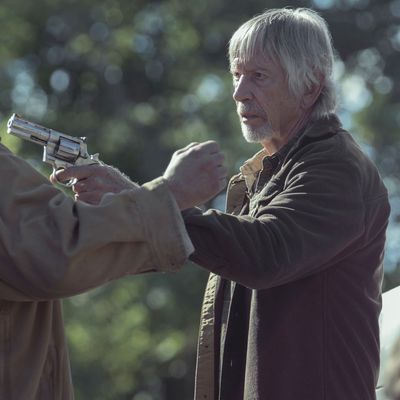
Henry Deaver gets closer to learning the truth about his own disappearance and the death of his father in this week’s creepy chapter of Hulu’s ode to the Master of Horror. While Henry is distracted by that journey and Alan Pangborn is sent to Syracuse on a mission, the most important person to both of them, Ruth Deaver, is left vulnerable. Could Henry Deaver’s willingness to defend a young man who seems to have no one be what ultimately destroys his life?
Before the disturbing final scenes, we see how Henry Deaver is getting pulled into his own past. The best elements of “Filter” are reflected in a scene that Ruth Deaver has with her grandson, Wendell, in which she talks about not being really sure “when” something is happening. She leaves a chess piece in each room as a signal to her brain that this is “present” and not “memory.” It tethers her to reality. Meanwhile, the episode is filled with images of the past, whether they’re the video recordings of his youth found by Henry (via The Kid) or how flung out of time The Kid looks in the suit of Ruth’s dead husband. Even the fact that Henry has to go to the funeral of his father again — reburied after being moved back home a few weeks ago — adds to the sense of temporal displacement that strengthens an exposition-heavy episode.
One of the pressing questions about “Filter”: Why did Henry Deaver bring his son, whom he rarely sees, to Castle Rock? He claims he did it so the boy could see his grandmother, but one has to wonder if it’s not to bring someone into the house who is closer to the same age that Henry was when he disappeared for 11 days. Did he think it might recharge Ruth’s memories in a way that would unlock something about that mystery?
What actually does seem to be unlocking Ruth’s psyche is the presence of the creepier-than-ever stranger on their property. The shot of The Kid in Matthew Deaver’s suit — the one that Ruth thinks she buried her husband in almost three decades ago — is disturbing. It feels like foreshadowing for the end of the episode, in which tragedy strikes both Juniper Hill and the Deaver home.
Before then, Henry Deaver has two key encounters during “Filter.” In the first, Molly Strand basically confesses to him that she killed his father. At first, it’s vague, allowing us more insight into Molly’s powers. She says she was “there” with Henry when he disappeared, but she doesn’t have the details he’s searching for. All she knows is what he felt. He was afraid, and then he was relieved. She tells an astonished Henry that he wanted his father dead. And she confesses to pulling out the breathing tube, adding the line, “We did it together.” Henry’s hands were Molly’s hands. He tells her she’s crazy and storms off, but there’s clearly still more to learn about why Henry wanted his father dead and the role Molly played in his murder.
While Henry is learning about his past, his common-law stepfather is on a quest, one assigned to him by The Kid with the promise of being able to save Ruth. He heads to Syracuse in search of the car so tied to Warden Lacy. We’ve seen the car in two crucial scenes — the one in which Lacy drove off a cliff and decapitated himself, and the one in which Pangborn saw The Kid in the warden’s trunk. Why does The Kid want it? Whatever the reason, Alan hunts it down, and basically steals it at gunpoint.
The crucial scenes in “Filter” come late at night, in the woods near Castle Lake. Henry Deaver is following the path that he saw a younger version of himself follow on home video, when he stumbles upon two men around a fire. One, Willie, is young and talkative. The other, Odin Branch, is older and deaf (and played by deaf actor C.J. Jones, recently famous for his supporting work in Baby Driver). And yet Odin gives us most of the exposition, filtered through his interpreter, Willie. Odin explains that he knew Henry’s father and that they shared a belief that nature was the true church of God. Away from all of the noise of society was the only place anyone could possibly hear the true voice of their lord and savior. Henry’s father believed he could hear it out here in the middle of nowhere.
But, in typical King fashion, what Jeffrey Deaver was seeking and what Odin Branch made himself deaf to find is a bit more complicated than religious understanding. Odin explains the “Nature of the Schisma,” an idea that people can hear our universe basically trying to reconcile itself with alternate plains of reality. There are “other heres, other nows,” and the Schisma is bringing them all together into a reality. For some, it sounds like ringing in the ears, and it’s louder now than it has been in decades. The best way to hear it is to drown out all other sound and so Henry’s father devised a device called “the Filter.” He didn’t get to build it, but Odin did.
After the Hulu commercial break, we see it and it looks like a relatively harmless soundproof room in a camper. But Odin swears, “Inside this chamber is total silence.” He shoves Henry in and our protagonist has what looks like a breakdown. He hears something. Images flash by and he screams. It’s unpleasant but unclear what exactly he’s hearing or experiencing. We’ll likely know more next week.
We’ll also likely know more about the disturbing ending. Alan comes home to find The Kid outside, escaped from Juniper Hill after a deadly fire, and promising that he will build a monument to Warden Lacy. Uh oh. His hand is bloody. And The Kid asks Alan Pangborn a scary question: “Why would you leave me in that trunk, Sheriff?” Inside, a record skips, the smoke alarm beeps, and Ruth Weaver is GONE.
Four Past Midnight
• Wendell reads a line from the program for his grandfather’s reinterment that’s important. “Death is swallowed up in victory.” It’s from Corinthians 15:54, and the rest feels key to a show that features at least one character who seems to be immortal: “When the perishable has been clothed with the imperishable and the mortal with immortality, then the saying that is written will come to pass: ‘Death has been swallowed up in victory.’”
• Castle Rock doesn’t use a lot of music, but, when it does, it seems to throw in songs from other generations, adding to the temporal confusion. Case in point, the use of “The Sun Ain’t Gonna Shine Anymore” by the Walker Brothers this week.
• Kevin Hooks, another TV directing icon, helms this hour. He’s directed episodes of The X-Files, The Punisher, Mr. Mercedes, Castle, The Good Wife, Supernatural, 24, and Lost, among many others, all the way back to St. Elsewhere and V. He also helmed Wesley Snipes’s Passenger 57.
• The references were a little light this week, but check out the incredible Easter egg on a bus in the salvage yard, in our feature (updated weekly) on Stephen King references in Castle Rock.


